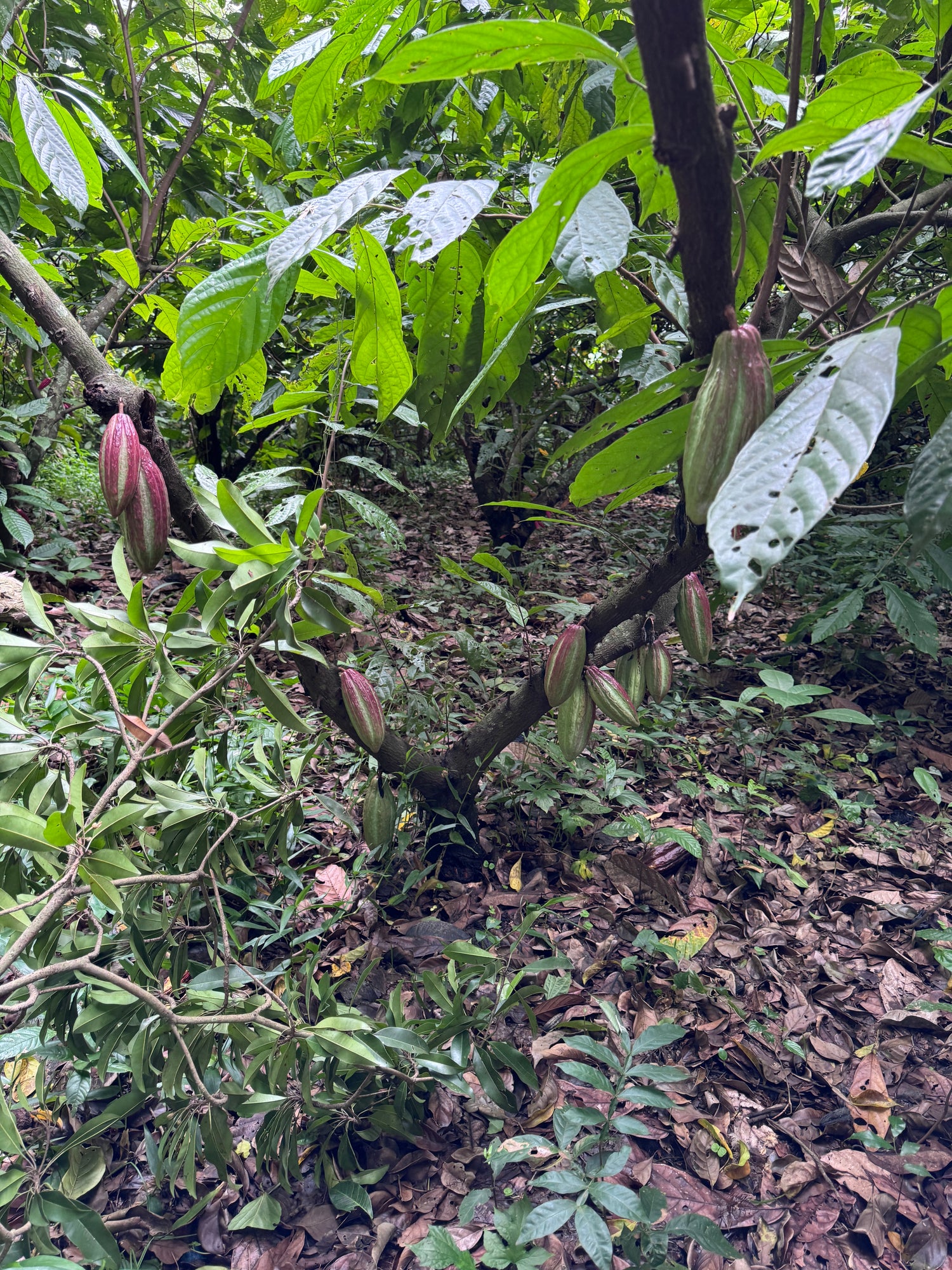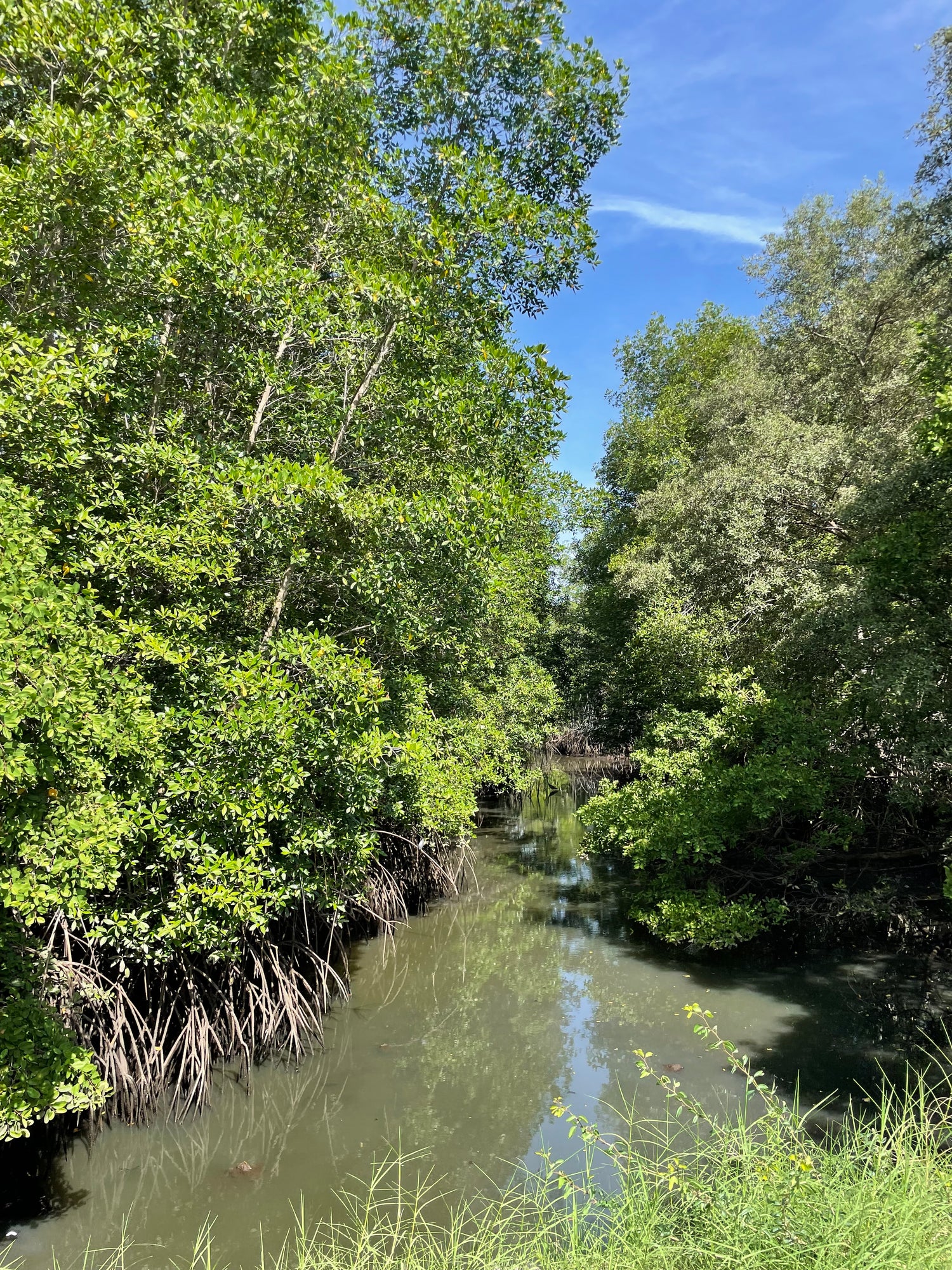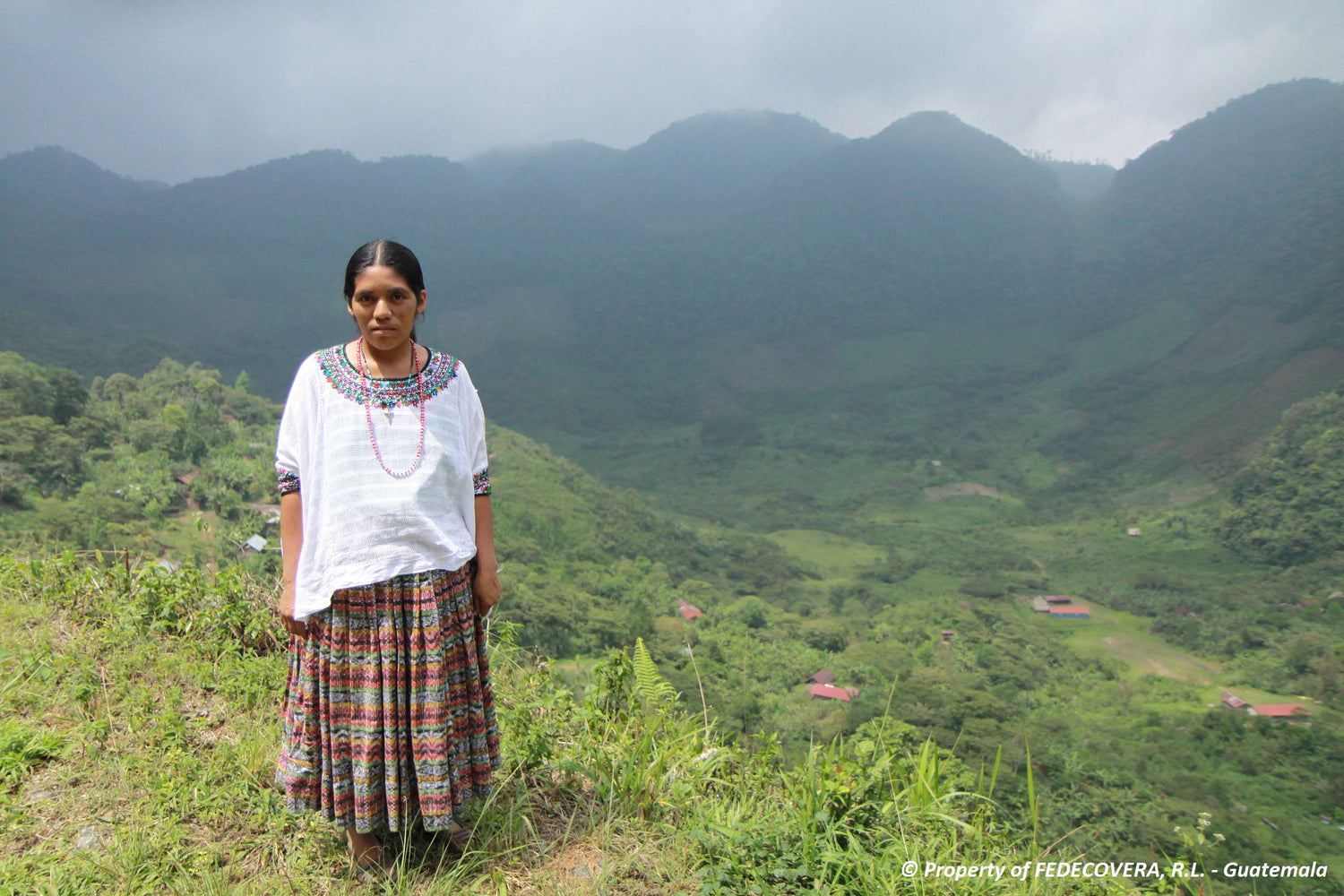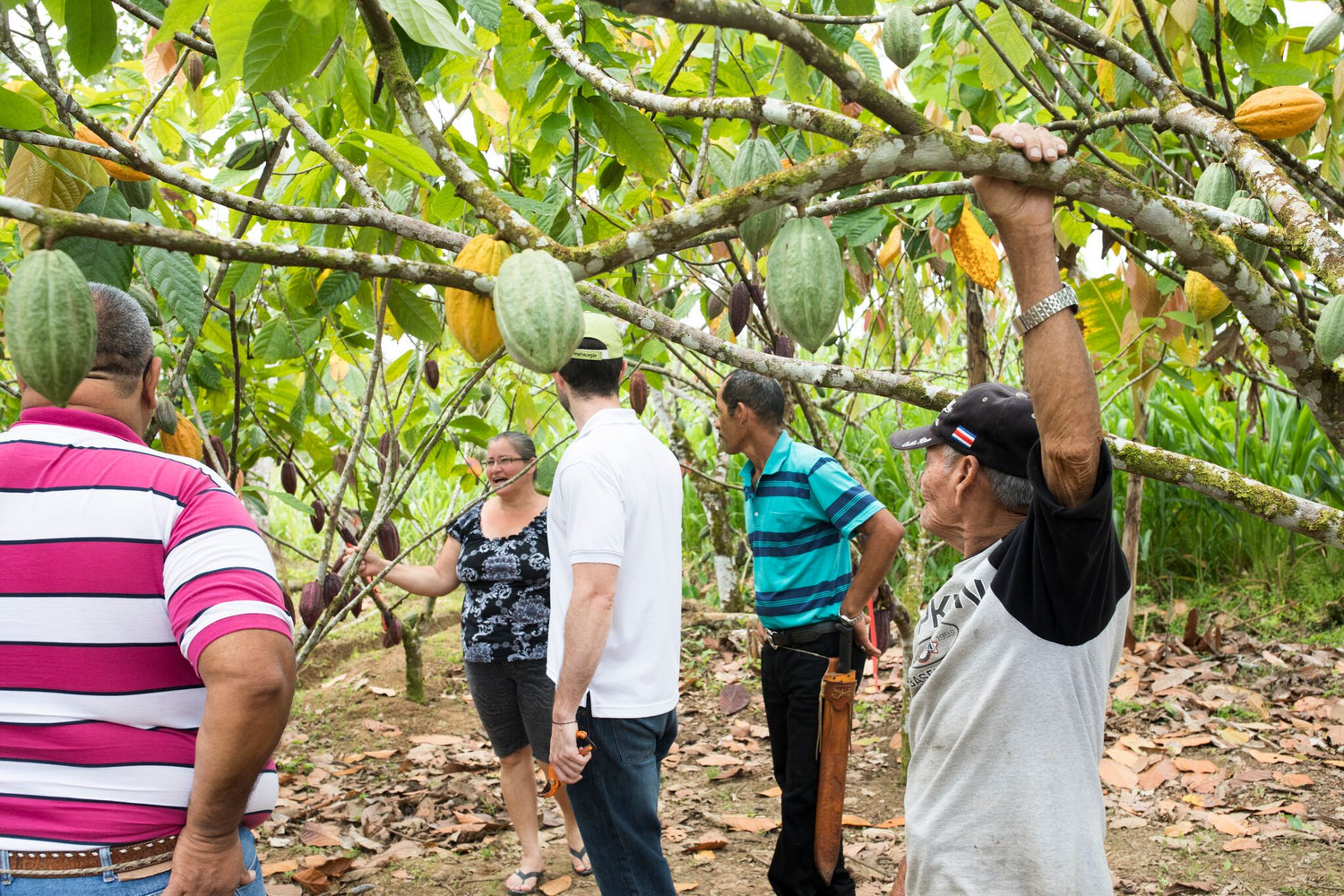Ceremonial Cacao (Artisanal Cacao Paste): a natural remedy
Our single origin small-batch cacaos are sourced from the finest cacaotales of El Salvador, Guatemala, Costa Rica and Mexico, and are expertly transformed to create a symphony of rich, velvety flavors that dance across your palate and soul.
Whether you're seeking a moment of indulgence or looking to elevate your daily routine, our cacaos are the perfect choice. So why settle for mass-produced unhealthy drinking beverages when you can indulge in the artistry and craftsmanship of our artisanal whole cacao paste?
EL SALVADOR · GUATEMALA · COSTA RICA · MEXICO
How we do it
We produce the Cacao Paste using slow, meticulous artisanal methods with extra care and love. We start by hand sorting the raw cacao beans before gently roasting them to create a unique profile for each cacao origin. Next, we "crack" and "winnow" the beans until they become "cacao nibs" (beans without the husk). We then pour the nibs into our small stone mill, which transforms them into a rustic cacao paste.
Our version of "ceremonial cacao" is a tribute to our Mesoamerican roots and admiration of the ancestral practices and uses of the cacao as a "plant medicine". We exclusively choose sustainable and traceable rare cacaos from Mesoamerica, with no added sugar or aromas, and nothing removed. The cacao butter/fat remains in the cacao paste. Our artisanal processes are unique and make our ceremonial cacaos special.
We work directly with specialty cacao beans from our family farm, Finca Cuyancùa, located in El Salvador, as well as other farms in El Salvador such as Finca S.Fernando (Atehuàn), La Carrera (Lenca), Parras Lempa (Tlaloc), and cooperatives across Central America such as Fedecovera - Guatemala (Q'eqchi') and Nahua in Costa Rica (Nahua), and El Vado, Chiapas, Mexico.
Each of our cacao's has its own specific flavor profile, ranging from earthy to spicy, fruity to floral.
We are vertically integrated and buy cacao directly from the farms for Salvadorean cacaos, and from a trusted partner for those cacaos from Guatemala and Costa Rica.
How to prepare the perfect Cacao Cup?
Once chopped finely, the paste is easy to dissolve in hot water or plant-based beverage, and you can whisk it by hand into a frothy drink or use a blender. You can add from 20 g to 30 g of cacao.
When chopping the cacao, you will see the white spots of cacao butter, which naturally make up around half of the bean’s paste, and create the creamy rich texture of the drink.
There are so many ancient recipes, but for sure, the ancient Mesoamerica cacao drink was made using water and not cow milk. Some ancient recipes recalls the use of achiote, corn, vanilla, honey and chili.
But if you wish to enhance the cacao, you can add any botanicals you want, like ashwagandha, mushrooms (Reishi, Chaga, Cordyceps...), maca, ginseng, ginger, cinnamon, cayenne pepper, cardamom, star anise, cloves, rose petals, lavender, natural vanilla or any other spice or herb you like. You can drink it bitter, but some also like to sweeten the drink with honey, dates and also consider to use dried prunes as an alternative to processed sugars.
Our Cacao is the product of a collaboration of intentions
We only work with farmers who grow the cacao with profound respect for the cacao trees and the ecosystem. We ensure to give you the best cacao experience we could.
We craft the beans ourselves into Ceremonial Cacao with passion, using artisanal methods and feeling love for our craft as we prepare the product. We show gratitude for what we have and what we are doing with our cacao project, and we make sure that everything has been made with extra care and love.
We invite you to prepare and savor this rich, healthy and nourishing drink as part of your own daily mindfulness practice, or with others, if you want. Anybody can experience different connection with this plant, follow your inner self. You might not want to drink it every day, but just in some days; this is totally fine. It's very personal.
Why is Cacao called ‘Ceremonial’?
This is still an open debate. People are could get easily confused with terms and definitions. "Ceremonial Cacao" its a nice form to differentiate our minimally processed, artisanal pure cacao paste, from the industrial cacao mass or paste, cacao powder or commercial hot chocolate preparations we usually find in supermarkets, stores and pastry shops, which are mostly unethical, ultra-refined and ultra-processed, and have sugar in it.
Cacao in its purest form has been re-discovered as a "planta de poder", a real "superfood" rich in minerals, fibre, vitamins, antioxidants and neurotransmitters these days.
Native civilisations along Mesoamerica, considered cacao part of the sacred for millennia and have known pretty well the multiple benefits and properties it has, but many traditions and cultures were sadly lost during the Spanish invasion and the subsequent colonial period.
Mesoamerica is a historically and culturally defined geographic area comprising current central and south Mexico, Belize, Guatemala, El Salvador, and border regions of Honduras, western Nicaragua, and northwestern Costa Rica. In this region, for millennia, cacao was considered sacred and divine. It was consumed as a natural remedy mostly mixed with water and corn, but also was used as a currency. The last Aztec Emperor, Moctezuma II, used to drink 50 cups of cacao a day.
The entire Yucatán Peninsula together with the Mexican states of Tabasco and Chiapas, the rest of Guatemala and Belize, as well as the border regions of Honduras and El Salvador, were the home to the Maya civilisation, one of the most advanced and highly developed societies in ancient Mesoamerica.
Cacao and the "bliss" molecule
Mood enhancing substances in cacao make it particularly suitable for personal creativity and inner work from an holistic perspective. It could also be a change in our life-style. Whole cacao contain the "bliss" molecule known as Anandamide, an endocannabinoid. It also contains other pleasure-related neurotransmitters such as dopamine, serotonin and phenylethylamine (PEA), along with the gentle stimulant Theobromin. When we put natural cacao in our body, it makes us feel like we are falling in love; relaxed, mindful, euphoric, nourished and energized.
What is a Cacao Ritual/Ceremony/Circle?
For over a decade, spiritual and holistic practitioners have been rediscovering the use of cacao. While modern "cacao ceremonies or circles" can vary in their focus, at the heart of these practices is the consumption of cacao in its purest form. Some people claim that cacao increases creativity and helps to lower tension and stress.
Today, modern cacao circles or ceremonies aim to rebalance the energies within us and restore good health and harmony. By opening our hearts, cacao can help us work through past blocks and traumas and address repressed negative energy. Many cacao circles combine aspects of personal growth and mindfulness with other traditions and practices, such as meditation, prayer, breathwork, song, music, and dance.
In our opinion, you don't have to be a "descendant" of the Mayan or Mexica cultures to guide your own individual or public ritual. You can honor the plant and its sacredness and build your connection with it. However, it's important to avoid any form of cultural appropriation of the modern descendants of indigenous groups of Mesoamerica, such as modern mayas f.e.
There is no evidence of specific cacao ceremonies in ancient times as they are intended now. Historians and evidence suggest that cacao was certainly a drink that Mesoamericans used to have in special occasions and even in ceremonies, such as corn or harvest ceremonies, funerals, engagements, and rewards for battles. What we are seeing today is a completely new thing, and everybody has their own perspective on making it special.
"Can I use Ceremonial Cacao, without the ‘Ceremony’?
Yes! Our intentions is to bring to you new cacao experiences, flavours, strains, terroirs for a more conscious and pure use of it. Cacao is increasingly used by individuals as part of a healthy an conscious diet, integrated into their daily routine (often in place of coffee) and to support their own personal practices. It can be enjoyed as a warm beverage, or added to smoothies, muesli or other delicious treats.
The "medicinal" and mood-enhancing effects of natural cacao are proven and more and more people consume cacao for their well-being; to aid concentration, calm the nervous-system and boost their energy and creativity.

EL SALVADOR
FINCA CUYANCÚA - Our Family's Farm
Single Estate Farm
Our farm is located in Atecozol, Izalco, a municipality of Sonsonate at 1,312 feet (400 meters) above sea level. We are near many waterways, and a small stream crosses the farm and fills up the reservoir that we use for irrigation.
In the early 2000’s JuanRa’s dad, Rafael, started to enhance the ancient cacaotal while also creating a cooperative of fine flavor cacao producers ES-CACAO. He took the initiative to develop a cacao nursery, and to transform the old coffee mill into a modern post-harvest facility where cacao from all the growers in the cooperative is fermented and dried to bring out the best quality the beans can offer. Over the years, we’ve held many seminars on proper agricultural practices at different stages of cacao growing, from planting and grafting to pruning and harvesting.
Apart from the fact that we helped plant some of the trees that produce these cosmically delicious beans, we are very attached to this farm because of all the wonderful learning experiences we’ve had here. This was where our initial encounter took place with the magical plant of theobroma cacao, and where JuanRa formed precious family memories of going to the farm during the weekend with his grandparents and father ever since he was very little. Fine flavor trinitario acriollado and DNA test-confirmed criollo cacao trees now grow underneath the tropical rainforest canopy, in community with other plants such as mango, banana, star apple, avocados, oranges, tropical flowers, vanilla, and cinnamon.
Another interesting fact is that the region where the farm is located used to be an indigenous settlement thousands of years ago. While walking or working on the land, you can easily find carved obsidian objects and small pieces of pottery scattered around, left by the people who called this home before we did.
Sensory analysis of the cacao
Aroma: Rum, slightly sweet, with notes of chocolate and caramel.
Flavor: Intense, dark, earthy flavors initially, with upfront bitterness. The flavor notes develop into green and floral notes reminiscent of orange blossom and jasmine.

EL SALVADOR
ATEHUÁN Finca S.Fernando
Single Estate Farm - Finca San Fernando, Ateos, El Salvador
Fine Flavor Cacao cultivation on the San Fernando farm started just several years ago, thanks to advocacy from VAICACAO co-founder JuanRa. When JuanRa outlined to one of the farm owners the environmental and economic advantages of planting cacao trees, as compared to other crops, the farm owner was inspired to join the local cacao cooperative and to begin growing fine flavor trinitario acriollado cacao. He quickly developed the farm into one of the steadiest cacao producers in El Salvador. A team of five people work on the cacao farm, using modern and technologically advanced methods.
The San Fernando farm sits at 2,198 feet (670 meters) above sea level, on the outskirts of the gently sweeping mountain range Cordillera del Balsamo, located in Ateos, municipality of Sacacoyo, in the La Libertad department. The cacao trees here grow among fragrant mahogany and cedar trees, plus a local white cedar called volador. We are proud to be the first to export this cacao from El Salvador and to offer it to the world through our Atehuàn, chocolate bars and holistic ceremonial cacao, which we named after the historical pre-Columbian name of this beautiful region.
Sensory analysis of the cacao
Aroma: Soft notes of sweet vanilla fudge, cream, and toffee.
Flavor: Starts off quite dark in flavor, then gives a strong sweetness. Some brown fruit flavors, with very subtle stone fruit flavors. Bitter finish.
Traceability: We source this cacao directly from the farm, working independently to build strong relationships with growers. This approach allows us to ensure full transparency and traceability, from the soil where the cacao is cultivated to the final product. By partnering with farmers who value sustainability and ethical practices, we bring you cacao of exceptional quality with a story worth sharing.

EL SALVADOR
LENCA, Hacienda La Carrera
Single farm in the Biosphere close to the Jiquilisco Bay, El Salvador
Tropical fruit paradise: The Hacienda San Jose del Real de La Carrera is one of the oldest and biggest cacao farms in El Salvador. This farm sits beside the mangroves of Jiquilisco Bay, in the department of Usulutan, on the southeast Pacific coast of El Salvador, a region known for its rich and fertile soil. The cacao trees here were initially planted more than half a century ago, and were at one point left unattended due to civil war and government-imposed land reform. Today, younger generations have done tremendous work to rescue these previously abandoned cacao lands. A natural hybridization of many special trinitario acriollado cacao strains has developed into a unique hybrid found only on this estate. Skilled farm workers complete the post-harvest process onsite by carefully fermenting and drying the cacao.
To give you additional visuals of the beautiful blue and green landscape: the area where the cacao is planted, at 82 feet (25 meters) above sea level, is surrounded by mango trees. Farther away on the estate, coconut trees border the mangroves,and still farther away on the same property you’ll find plantains and sugar cane. We named this chocolate bar after the Lenca, a Mesoamerican indigenous people who enjoyed a thriving culture for centuries and likely millennia before Spanish invasion, who had frequent contact with Maya and other groups, and who endure and flourish to this day.
Sensory analysis of the cacao
Aroma: fruit cake, fruity, nutty.
Flavor: chocolatey, fruity, floral. A variety of different fruit flavors. It develops into richer banana and dried fruit flavors with an earthy backbone, and ends on green banana notes. The aftertaste is clean with lingering chocolate and banana notes.
Traceability: We source this cacao directly from the farm, working independently to build strong relationships with growers. This approach allows us to ensure full transparency and traceability, from the soil where the cacao is cultivated to the final product. By partnering with farmers who value sustainability and ethical practices, we bring you cacao of exceptional quality with a story worth sharing.

GUATEMALA
Q'EQCHI'
Micro-region - Cacao from Cobán, Alta Verapáz (Cooperatives System)
Rainforest collaboration: The magical cacao beans in our Q’Eqchí chocolate bar and Artisanal Ceremonial cacao come from deep in the rainforest in Guatemala, from FEDECOVERA - the Federation of Cooperatives of Cobán, Alta and Baja Verapáz - an association of 40 cooperatives made up by approximately 31,000 Qʼeqchiʼ and Pocomchi farmers. The federation is one of Guatemala’s leading reforestation organizations, and they are recognized worldwide for their production of organic cardamom. They have been leading by example since 1976, fulfilling their mission to provide a way for farmers to improve their living conditions while honoring and protecting their culture and ecosystem.
Farming families produce and export diversified crops which range from cacao to coffee, cardamom, pepper, and turmeric, across the Mayan rainforest canopy of northern Guatemala. Their delicious cacaos are certified organic and consist of a blend of criollo and trinitario strains.
Sensory analysis of the cacao
Aroma: Ripe cherries, cocoa, cardamom, cream
Traceability:We rely on cacao specialists like Daarnhouwer, who work directly at the farm-gate to source this cacao origin. Their expertise ensures that every purchase is conducted ethically and transparently, guaranteeing both traceability and exceptional quality. By collaborating with trusted partners, we uphold our commitment to sustainability and integrity, even in cases where we cannot be physically present at the farms..

EL SALVADOR
FINCA PARRAS LEMPA
Single Estate Farm
River valley beauty: The cacao in our Tlaloc chocolate bars, and holistic ceremonial cacao comes from a single estate, and we invite you to travel there with us virtually, to imagine the tropical landscape as you taste this terroir! The farm is located in El Salvador’s lush Lempa River valley, in the municipality of San Vicente, at 131 feet (40 meters) above sea level. A smaller river called the Acahuapa flows through the farmland, watering its crops of cacao, coconuts, and plantains. We love the fine flavor cacao that grows in this fertile land crisscrossed with life-giving water, so we named the chocolate bar Tlaloc, after the god of water celebrated by the Aztec and Maya civilizations.
A team of seven plus a supervisor handle the daily tasks on the farm. After harvesting their cacao, a hybrid of trinitario acriollado varieties, they ferment and dry the cacao onsite to ensure the utmost quality. Benedicto, whose family owns the estate, is one of several co-founders of a local cooperative of cacao producers, where we are also members and with whom we have worked since the beginning of our cacao and chocolate projects. It is a pleasure to have witnessed their hard work firsthand throughout the years, and an honor to be the first to bring our dear friend Benedicto’s specialty cacao outside of El Salvador and to share it with the rest of the world!
Sensory analysis of the cacao
Aroma: Very mild, with notes of subtle milk chocolate, sweet caramel, and dates.
Flavor: Initial rich chocolate kick that develops into more earthy flavors with subtle green notes. Finishes with pronounced nutty flavors and a nutty and chocolatey aftertaste.
Traceability: We source this cacao directly from the farm, working independently to build strong relationships with growers. This approach allows us to ensure full transparency and traceability, from the soil where the cacao is cultivated to the final product. By partnering with farmers who value sustainability and ethical practices, we bring you cacao of exceptional quality with a story worth sharing.

COSTA RICA
NAHUA
Scrumptious social impact: Nahua is Costa Rica’s leading fine flavor single origin cacao provider, with a strong social mission of improving farmer livelihoods and conserving the environment. The organization is B-Corp certified and works directly with local farming families to grow some of the best trinitario hybrid cacaos available. We rely on their diligent work in handling the crucial post-harvest processes, which ensure the very best outcome for these flavorful beans. Nahua is made up of a network of 430 smallholder cacao farming families, in an area of 800 acres across Guatuso and Upala in the northern part of the country, between the Caño Negro Wildlife Reserve and the Cordillera de Guanacaste mountain range. This area is named for the region’s original inhabitants, an indigenous tribe known as the Maleku, who still reside in the area.
Nahua founder Juan Pablo has been an active pioneer and mentor not only locally in Costa Rica, but also throughout Central America’s cacao farming community, by sharing his experience at regional seminars and through ongoing friendly advice. We have expanded our knowledge of agricultural practices thanks to him, and have also benefited from his excellent example of how to create added value to the cacao crops by transforming the magical fruits of the cacao trees into top quality sustainable products. Power to the people!
We source this cacao throughtout our partner, Daarnhowuer.
Sensory analysis of the cacao
Aroma & Flavor: Nahua’s cacao bean flavor profile is very balanced, characterized by strong cacao notes, yellow fruits, and warm and full cherry flavors, combined with a subtle hint of grapefruit and full-bodied caramel notes.
Traceability:We rely on cacao specialists like Crafting Markets, who work directly at the farm-gate to source this cacao origin. Their expertise ensures that every purchase is conducted ethically and transparently, guaranteeing both traceability and exceptional quality. By collaborating with trusted partners, we uphold our commitment to sustainability and integrity, even in cases where we cannot be physically present at the farms.

MEXICO
ASOC. EL VADO, FINCA LA RIOJA
Collective of Cacaoteros: Asociación El Vado, Tuzantán, Chiapas, Mexico
Collected at: Finca La Rioja, Cacahoatán, Chiapas, Mexico
Tuzantán is the name we have given to this cacao, cultivated and handled with great care by the "El Vado" cacao growers' association. This collective consists of 14 cacao-growing families who have formed an alliance with Finca La Rioja. Here, the cacao is graded, fermented, dried, and prepared for export.
Through this partnership, efforts are being made to preserve the natural environment of their territory, reclaim and enhance the value of cacao, which has been a staple in this region since the Olmec era, and provide sustainable job opportunities for the local community.
Traceability: We rely on cacao specialists like Daarnhouwer, who work directly at the farm-gate to source this cacao origin. Their expertise ensures that every purchase is conducted ethically and transparently, guaranteeing both traceability and exceptional quality. By collaborating with trusted partners, we uphold our commitment to sustainability and integrity, even in cases where we cannot be physically present at the farms.

HONDURAS
